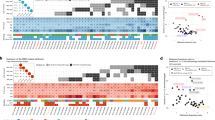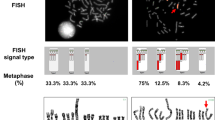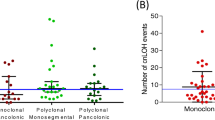Abstract
Dihydropyrimidine dehydrogenase is a crucial enzyme for the degradation of 5-fluorouracil (5FU). DPYD, which encodes dihydropyrimidine dehydrogenase, is prone to acquire genomic rearrangements because of the presence of an intragenic fragile site FRA1E. We evaluated DPYD copy number variations (CNVs) in a prospective series of 242 stage I–III colorectal tumours (including 87 patients receiving 5FU-based treatment). CNVs in one or more exons of DPYD were detected in 27% of tumours (deletions or amplifications of one or more DPYD exons observed in 17% and 10% of cases, respectively). A significant relationship was observed between the DPYD intragenic rearrangement status and dihydropyrimidine dehydrogenase (DPD) mRNA levels (both at the tumour level). The presence of somatic DPYD aberrations was not associated with known prognostic or predictive biomarkers, except for LOH of chromosome 8p. No association was observed between DPYD aberrations and patient survival, suggesting that assessment of somatic DPYD intragenic rearrangement status is not a powerful biomarker to predict the outcome of 5FU-based chemotherapy in patients with colorectal cancer.
This is a preview of subscription content, access via your institution
Access options
Subscribe to this journal
Receive 6 print issues and online access
$259.00 per year
only $43.17 per issue
Buy this article
- Purchase on Springer Link
- Instant access to full article PDF
Prices may be subject to local taxes which are calculated during checkout




Similar content being viewed by others
References
Parkin DM, Bray F, Ferlay J, Pisani P . Global cancer statistics, 2002. CA Cancer J Clin 2005; 55: 74–108.
Kanthan R, Senger JL, Kanthan SC . Molecular events in primary and metastatic colorectal carcinoma: a review. Patholog Res Int 2012; 2012: 597497.
Al-Sohaily S, Biankin A, Leong R, Kohonen-Corish M, Warusavitarne J . Molecular pathways in colorectal cancer. J Gastroenterol Hepatol 2012; 27: 1423–1431.
Meyerhardt JA, Mayer RJ . Systemic therapy for colorectal cancer. N Engl J Med 2005; 352: 476–487.
Twelves C, Wong A, Nowacki MP, Abt M, Burris H III, Carrato A et al. Capecitabine as adjuvant treatment for stage III colon cancer. N Engl J Med 2005; 352: 2696–2704.
Andre T, Boni C, Navarro M, Tabernero J, Hickish T, Topham C et al. Improved overall survival with oxaliplatin, fluorouracil, and leucovorin as adjuvant treatment in stage II or III colon cancer in the MOSAIC trial. J Clin Oncol 2009; 27: 3109–3116.
Tournigand C, Andre T, Bonnetain F, Chibaudel B, Lledo G, Hickish T et al. Adjuvant therapy with fluorouracil and oxaliplatin in stage II and elderly patients (between ages 70 and 75 years) with colon cancer: Subgroup Analyses of the Multicenter International Study of Oxaliplatin, Fluorouracil, and Leucovorin in the Adjuvant Treatment of Colon Cancer Trial. J Clin Oncol 2012; 30: 3353–3360.
Van Loon K, Venook AP . Adjuvant treatment of colon cancer: what is next? Curr Opin Oncol 2011; 23: 403–409.
Heggie GD, Sommadossi JP, Cross DS, Huster WJ, Diasio RB . Clinical pharmacokinetics of 5-fluorouracil and its metabolites in plasma, urine, and bile. Cancer Res 1987; 47: 2203–2206.
van Kuilenburg ABP, Hausler P, Schalhorn A, Tanck MWT, Proost JH, Terborg C et al. Evaluation of 5-fluorouracil pharmacokinetics in cancer patients with a c.1905+1G>A mutation in DPYD by means of a Bayesian limited sampling strategy. Clin Pharmacokinet 2012; 51: 163–174.
Mattison LK, Soong R, Diasio RB . Implications of dihydropyrimidine dehydrogenase on 5-fluorouracil pharmacogenetics and pharmacogenomics. Pharmacogenomics 2002; 3: 485–492.
van Kuilenburg ABP . Dihydropyrimidine dehydrogenase and the efficacy and toxicity of 5-fluorouracil. Eur J Cancer 2004; 40: 939–950.
van Kuilenburg ABP, Haasjes J, Richel DJ, Zoetekouw L, van Lenthe H, De Abreu RA et al. Clinical implications of dihydropyrimidine dehydrogenase (DPD) deficiency in patients with severe 5-fluorouracil-associated toxicity: identification of new mutations in the DPD gene. Clin Cancer Res 2000; 6: 4705–4712.
Milano GA, Etienne MC, Pierrefite V, Barberi-Heyob M, Deporte-Fety R, Renée N . Dihydropyrimidine dehydrogenase deficiency and fluorouracil-related toxicity. Br J Cancer 1999; 79: 627–630.
Ciccolini J, Mercier C, Evrard A, Dahan L, Boyer JC, Duffaud F et al. A rapid and inexpensive method for anticipating severe toxicity to fluorouracil and fluorouracil-based chemotherapy. Ther Drug Monit 2006; 28: 678–685.
Amstutz U, Farese S, Aebi S, Largiader CR . Dihydropyrimidine dehydrogenase gene variation and severe 5-fluorouracil toxicity: a haplotype assessment. Pharmacogenomics 2009; 10: 931–944.
Deenen MJ, Tol J, Burylo AM, Doodeman VD, de BA, Vincent A et al. Relationship between single nucleotide polymorphisms and haplotypes in DPYD and toxicity and efficacy of capecitabine in advanced colorectal cancer. Clin Cancer Res 2011; 17: 3455–3468.
Etienne MC, Chéradame S, Fischel JL, Formento P, Dassonville O, Renée N et al. Response to fluorouracil therapy in cancer patients: the role of tumoral dihydropyrimidine dehydrogenase activity. J Clin Oncol 1995; 13: 1663–1670.
Salonga D, Danenberg KD, Johnson MR, Metzger R, Groshen S, Tsao-Wei DD et al. Colorectal tumors responding to 5-fluorouracil have low gene expression levels of dihydropyrimidine dehydrogenase, thymidylate synthase, and thymidine phosphorylase. Clin Cancer Res 2000; 6: 1322–1327.
Hormozian F, Schmitt JG, Sagulenko E, Schwab M, Savelyeva L . FRA1E common fragile site breaks map within a 370kilobase pair region and disrupt the dihydropyrimidine dehydrogenase gene (DPYD). Cancer Lett 2007; 246: 82–91.
Arlt MF, Durkin SG, Ragland RL, Glover TW . Common fragile sites as targets for chromosome rearrangements. DNA Repair (Amst) 2006; 5: 1126–1135.
van Kuilenburg ABP, Meijer J, Mul ANP, Hennekam RCM, Hoovers JMN, de Die-Smulders CEM et al. Analysis of severely affected patients with dihydropyrimidine dehydrogenase deficiency reveals large intragenic rearrangements of DPYD and a de novo interstitial deletion del(1)(p13.3p21.3). Hum Genet 2009; 125: 581–590.
van Kuilenburg ABP, Meijer J, ANPM Mul, Meinsma R, Schmid V, Dobritzsch D et al. Intragenic deletions and a deep intronic mutation affecting pre-mRNA splicing in the dihydropyrimidine dehydrogenase gene as novel mechanisms causing 5-fluorouracil toxicity. Hum Genet 2010; 128: 529–538.
Walther A, Houlston R, Tomlinson I . Association between chromosomal instability and prognosis in colorectal cancer: a meta-analysis. Gut 2008; 57: 941–950.
Ticha I, Kleiblova P, Fidlerova J, Novotny J, Pohlreich P, Kleibl Z . Lack of large intragenic rearrangements in dihydropyrimidine dehydrogenase (DPYD) gene in fluoropyrimidine-treated patients with high-grade toxicity. Cancer Chemother Pharmacol 2009; 64: 615–618.
Pare L, Paez D, Salazar J, del RE, Tizzano E, Marcuello E et al. Absence of large intragenic rearrangements in the DPYD gene in a large cohort of colorectal cancer patients treated with 5-FU-based chemotherapy. Br J Clin Pharmacol 2010; 70: 268–272.
Savva-Bordalo J, Ramalho-Carvalho J, Pinheiro M, Costa VL, Rodrigues A, Dias PC et al. Promoter methylation and large intragenic rearrangements of DPYD are not implicated in severe toxicity to 5-fluorouracil-based chemotherapy in gastrointestinal cancer patients. BMC Cancer 2010; 10: 470.
Vindelov LL, Christensen IJ, Nissen NI . A detergent-trypsin method for the preparation of nuclei for flow cytometric DNA analysis. Cytometry 1983; 3: 323–327.
Largillier R, Namer M, Ramaioli A, Ferrero JM, Magne N, Courdi A et al. Prognostic value of S-phase fraction in 920 breast cancer patients: focus on T1N0 status. Int J Biol Markers 2003; 18: 273–279.
Schimanski CC, Linnemann U, Berger MR . Sensitive detection of K-ras mutations augments diagnosis of colorectal cancer metastases in the liver. Cancer Res 1999; 59: 5169–5175.
Cabelguenne A, Blons H, de W,I, Carnot F, Houllier AM, Soussi T et al. p53 alterations predict tumor response to neoadjuvant chemotherapy in head and neck squamous cell carcinoma: a prospective series. J Clin Oncol 2000; 18: 1465–1473.
Boland CR, Thibodeau SN, Hamilton SR, Sidransky D, Eshleman JR, Burt RW et al. A National Cancer Institute Workshop on Microsatellite Instability for cancer detection and familial predisposition: development of international criteria for the determination of microsatellite instability in colorectal cancer. Cancer Res 1998; 58: 5248–5257.
Cazals-Hatem D, Rebouissou S, Bioulac-Sage P, Bluteau O, Blanche H, Franco D et al. Clinical and molecular analysis of combined hepatocellular-cholangiocarcinomas. J Hepatol 2004; 41: 292–298.
Barault L, Veyrie N, Jooste V, Lecorre D, Chapusot C, Ferraz JM et al. Mutations in the RAS-MAPK, PI(3)K (phosphatidylinositol-3-OH kinase) signaling network correlate with poor survival in a population-based series of colon cancers. Int J Cancer 2008; 122: 2255–2259.
Weisenberger DJ, Siegmund KD, Campan M, Young J, Long TI, Faasse MA et al. CpG island methylator phenotype underlies sporadic microsatellite instability and is tightly associated with BRAF mutation in colorectal cancer. Nat Genet 2006; 38: 787–793.
Groden J, Thliveris A, Samowitz W, Carlson M, Gelbert L, Albertsen H et al. Identification and characterization of the familial adenomatous polyposis coli gene. Cell 1991; 66: 589–600.
Schouten JP, McElgunn CJ, Waaijer R, Zwijnenburg D, Diepvens F, Pals G . Relative quantification of 40 nucleic acid sequences by multiplex ligation-dependent probe amplification. Nucleic Acids Res 2002; 30: e57.
Morel A, Boisdron-Celle M, Fey L, Soulie P, Craipeau MC, Traore S et al. Clinical relevance of different dihydropyrimidine dehydrogenase gene single nucleotide polymorphisms on 5-fluorouracil tolerance. Mol Cancer Ther 2006; 5: 2895–2904.
Gross E, Busse B, Riemenschneider M, Neubauer S, Seck K, Klein HG et al. Strong association of a common dihydropyrimidine dehydrogenase gene polymorphism with fluoropyrimidine-related toxicity in cancer patients. PLoS ONE 2008; 3: e4003.
Schwab M, Zanger UM, Marx C, Schaeffeler E, Klein K, Dippon J et al. Role of genetic and nongenetic factors for fluorouracil treatment-related severe toxicity: a prospective clinical trial by the German 5-FU toxicity study group. J Clin Oncol 2008; 26: 2131–2138.
Loganayagam A, renas-Hernandez M, Fairbanks L, Ross P, Sanderson JD, Marinaki AM . The contribution of deleterious DPYD gene sequence variants to fluoropyrimidine toxicity in British cancer patients. Cancer Chemother Pharmacol 2010; 65: 403–406.
Amstutz U, Froehlich TK, Largiader CR . Dihydropyrimidine dehydrogenase gene as a major predictor of severe 5-fluorouracil toxicity. Pharmacogenomics 2011; 12: 1321–1336.
Magne N, Etienne-Grimaldi MC, Cals L, Renee N, Formento JL, Francoual M et al. Dihydropyrimidine dehydrogenase activity and the IVS14+1G>A mutation in patients developing 5FU-related toxicity. Br J Clin Pharmacol 2007; 64: 237–240.
Etienne MC, Formento JL, Chazal M, Francoual M, Magne N, Formento P et al. Methylenetetrahydrofolate reductase gene polymorphisms and response to fluorouracil-based treatment in advanced colorectal cancer patients. Pharmacogenetics 2004; 14: 785–792.
Lee SH, Shin MS, Kim HS, Park WS, Kim SY, Lee HK et al. Point mutations and deletions of the Bcl10 gene in solid tumors and malignant lymphomas. Cancer Res 1999; 59: 5674–5677.
Mertens F, Johansson B, Hoglund M, Mitelman F . Chromosomal imbalance maps of malignant solid tumors: a cytogenetic survey of 3185 neoplasms. Cancer Res 1997; 57: 2765–2780.
Iacopetta B, Kawakami K, Watanabe T . Predicting clinical outcome of 5-fluorouracil-based chemotherapy for colon cancer patients: is the CpG island methylator phenotype the 5-fluorouracil-responsive subgroup? Int J Clin Oncol 2008; 13: 498–503.
Roth AD, Delorenzi M, Tejpar S, Yan P, Klingbiel D, Fiocca R et al. Integrated analysis of molecular and clinical prognostic factors in stage II/III colon cancer. J Natl Cancer Inst 2012; 104: 1635–1646.
Naccarati A, Polakova V, Pardini B, Vodickova L, Hemminki K, Kumar R et al. Mutations and polymorphisms in TP53 gene–an overview on the role in colorectal cancer. Mutagenesis 2012; 27: 211–218.
Etienne-Grimaldi MC, Formento JL, Francoual M, Francois E, Formento P, Renee N et al. K-Ras mutations and treatment outcome in colorectal cancer patients receiving exclusive fluoropyrimidine therapy. Clin Cancer Res 2008; 14: 4830–4835.
Sasikumar R, Rejitha JR, Binumon PK, Manoj M . Role of Heterozygous APC mutation in niche succession and initiation of colorectal cancer—a computational study. PLoS ONE 2011; 6: e22720.
Mao C, Yang ZY, Hu XF, Chen Q, Tang JL . PIK3CA exon 20 mutations as a potential biomarker for resistance to anti-EGFR monoclonal antibodies in KRAS wild-type metastatic colorectal cancer: a systematic review and meta-analysis. Ann Oncol 2012; 23: 1518–1525.
Liao X, Morikawa T, Lochhead P, Imamura Y, Kuchiba A, Yamauchi M et al. Prognostic role of PIK3CA mutation in colorectal cancer: cohort study and literature review. Clin Cancer Res 2012; 18: 2257–2268.
Macartney-Coxson DP, Hood KA, Shi HJ, Ward T, Wiles A, O'Connor R et al. Metastatic susceptibility locus, an 8p hot-spot for tumour progression disrupted in colorectal liver metastases: 13 candidate genes examined at the DNA, mRNA and protein level. BMC Cancer 2008; 8: 187.
Sakata KI, Someya M, Matsumoto Y, Tauchi H, Kai M, Toyota M et al. Gimeracil, an inhibitor of dihydropyrimidine dehydrogenase, inhibits the early step in homologous recombination. Cancer Sci 2011; 102: 1712–1716.
Someya M, Sakata K, Matsumoto Y, Tauchi H, Kai M, Hareyama M et al. Effects of depletion of dihydropyrimidine dehydrogenase on focus formation and RPA phosphorylation. J Radiat Res 2012; 53: 250–256.
Jensen SA, Vainer B, Kruhoffer M, Sorensen JB . Microsatellite instability in colorectal cancer and association with thymidylate synthase and dihydropyrimidine dehydrogenase expression. BMC Cancer 2009; 9: 25.
Kobunai T, Ooyama A, Sasaki S, Wierzba K, Takechi T, Fukushima M et al. Changes to the dihydropyrimidine dehydrogenase gene copy number influence the susceptibility of cancers to 5-FU-based drugs: data mining of the NCI-DTP data sets and validation with human tumour xenografts. Eur J Cancer 2007; 43: 791–798.
Noguchi T, Tanimoto K, Shimokuni T, Ukon K, Tsujimoto H, Fukushima M et al. Aberrant methylation of DPYD promoter, DPYD expression, and cellular sensitivity to 5-fluorouracil in cancer cells. Clin Cancer Res 2004; 10: 7100–7107.
Ezzeldin HH, Lee AM, Mattison LK, Diasio RB . Methylation of the DPYD promoter: an alternative mechanism for dihydropyrimidine dehydrogenase deficiency in cancer patients. Clin Cancer Res 2005; 11: 8699–8705.
Yu J, McLeod HL, Ezzeldin HH, Diasio RB . Methylation of the DPYD promoter and dihydropyrimidine dehydrogenase deficiency. Clin Cancer Res 2006; 12: 3864.
Yu J, Freimuth RR, Culverhouse R, Marsh S, Watson MA, McLeod HL . DNA methylotype analysis in colorectal cancer. Oncol Rep 2008; 20: 921–927.
Amstutz U, Farese S, Aebi S, Largiader CR . Hypermethylation of the DPYD promoter region is not a major predictor of severe toxicity in 5-fluorouracil based chemotherapy. J Exp Clin Cancer Res 2008; 27: 54.
Hirota T, Date Y, Nishibatake Y, Takane H, Fukuoka Y, Taniguchi Y et al. Dihydropyrimidine dehydrogenase (DPD) expression is negatively regulated by certain microRNAs in human lung tissues. Lung Cancer 2012; 77: 16–23.
Gross E, Meul C, Raab S, Propping C, Avril S, Aubele M et al. Somatic copy number changes in DPYD are associated with lower risk of recurrence in triple-negative breast cancers. Br J Cancer 2013; 109: 2347–2355.
Koopman M, Venderbosch S, Nagtegaal ID, van Krieken JH, Punt CJ . A review on the use of molecular markers of cytotoxic therapy for colorectal cancer, what have we learned? Eur J Cancer 2009; 45: 1935–1949.
Koopman M, Venderbosch S, van TH, Ligtenberg MJ, Nagtegaal I, van Krieken JH et al. Predictive and prognostic markers for the outcome of chemotherapy in advanced colorectal cancer, a retrospective analysis of the phase III randomised CAIRO study. Eur J Cancer 2009; 45: 1999–2006.
Westra JL, Hollema H, Schaapveld M, Platteel I, Oien KA, Keith WN et al. Predictive value of thymidylate synthase and dihydropyrimidine dehydrogenase protein expression on survival in adjuvantly treated stage III colon cancer patients. Ann Oncol 2005; 16: 1646–1653.
Afzal S, Gusella M, Jensen SA, Vainer B, Vogel U, Andersen JT et al. The association of polymorphisms in 5-fluorouracil metabolism genes with outcome in adjuvant treatment of colorectal cancer. Pharmacogenomics 2011; 12: 1257–1267.
Acknowledgements
We thank the French Research Ministry (Programme Hospitalier de Recherche Clinique) for financial support and the Ligue Nationale Contre le Cancer (CIT programme) for PIK3CA, APC and CIMP analyses.
Author information
Authors and Affiliations
Corresponding author
Ethics declarations
Competing interests
Raymon Vijzelaar is employed by MRC-Holland that manufactures MLPA probemixes. The remaining authors declare no conflict of interest.
Rights and permissions
About this article
Cite this article
van Kuilenburg, A., Etienne-Grimaldi, MC., Mahamat, A. et al. Frequent intragenic rearrangements of DPYD in colorectal tumours. Pharmacogenomics J 15, 211–218 (2015). https://doi.org/10.1038/tpj.2014.68
Received:
Revised:
Accepted:
Published:
Issue Date:
DOI: https://doi.org/10.1038/tpj.2014.68



